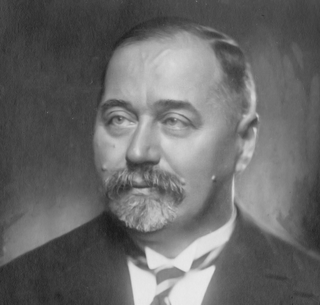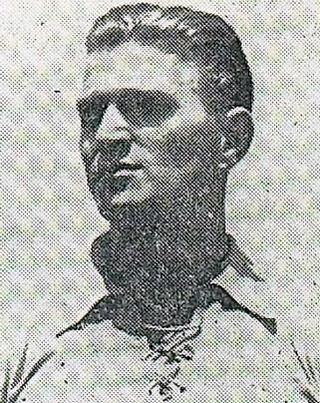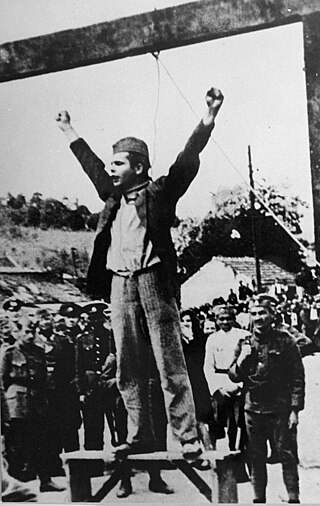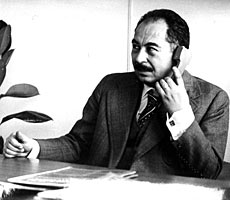Related Research Articles

Stjepan "Stipe" Mesić is a Croatian lawyer and politician who served as President of Croatia from 2000 to 2010. Before serving two five-year terms as president, he was prime minister of SR Croatia (1990) after the first multi-party elections, the last president of the Presidency of Yugoslavia (1991) and consequently secretary general of the Non-Aligned Movement (1991), as well as speaker of the Croatian Parliament (1992–1994), a judge in Našice, and mayor of his hometown of Orahovica.

The Croatian Peasant Party is an agrarian political party in Croatia founded on 22 December 1904 by Antun and Stjepan Radić as Croatian Peoples' Peasant Party (HPSS). The Brothers Radić believed that the realization of Croatian statehood was possible within Austria-Hungary, but that it had to be reformed as a Monarchy divided into three equal parts – Austria, Hungary, Croatia. After the creation of Kingdom of Yugoslavia in 1918, Party requested for the Croatian part of the Kingdom to be based on self-determination. This brought them great public support which culminated in 1920 parliamentary election when HPSS won all 58 seats assigned to Croatia.

Stjepan Radić was a Croat politician and founder of the Croatian People's Peasant Party (HPSS), active in Austria-Hungary and the Kingdom of Serbs, Croats and Slovenes.

Hrvatska radiotelevizija, or Croatian Radiotelevision, is Croatia's public broadcasting company. It operates several radio and television channels, over a domestic transmitter network as well as satellite. HRT is divided into three joint companies – Croatian Radio, Croatian Television and Music Production, which includes three orchestras and a choir.

The State of Slovenes, Croats and Serbs became merged with the Kingdom of Serbia and the Kingdom of Montenegro to form the nation of Yugoslavia in 1918. The formation of Yugoslavia began with the formation of the Yugoslav Committee, a collection of mostly Croats, then Serbs and later Slovenes, whose goal was to form a single south Slavic state. In October 1918 the Croatian Parliament declared the Kingdom of Croatia-Slavonia as an independent state, which, in December that same year, incorporated into the State of Slovenes, Croats and Serbs, merged with Kingdom of Serbia and Kingdom of Montenegro and created the Kingdom of Serbs, Croats and Slovenes. The kingdom would be renamed to Yugoslavia in 1929, and ruled by Serbian Karađorđević dynasty till Second World War. After the formation of Yugoslavia, Serbia attempted to create a "Greater Serbia" by using police intimidation and vote rigging to establish a Serbian controlled Yugoslavia. From 1929-1941 Serbian controlled Yugoslavia established control over Croatia through Royal Yugoslav police force brutality and assassinations of important Croatians.

Sanja Doležal is a Croatian singer and television host.

Stjepan Bobek was a Croatian and Yugoslav professional football striker and later football manager.

Stjepan Filipović was a Yugoslav communist who led the Kolubara Company of the Valjevo Partisan Detachment during the 1941 Partisan uprising. He was captured and executed in 1942 in Valjevo. A photo of him taken shortly before his execution became a symbol of resistance against fascism in the Second World War, and was, among others, exhibited in the United Nations building in New York. He was proclaimed People's Hero of Yugoslavia in 1949.
Dominik Mandić was a Herzegovinian Croat Franciscan and historian.
Franjo Mihalić was a Yugoslav and Croatian long-distance runner best known for his 1958 win at the Boston Marathon and his marathon silver medal in the 1956 Summer Olympics. Mihalić competed mostly in marathons, road races and cross country races, distinguishing himself by winning many top-level international competitions in the 1950s and setting a combined 25 Croatian and later Yugoslavian national records in long-distance track events between 5000 m and 25 km. In 1957, he became the inaugural winner of the Golden Badge, the award for the best sportsperson of Yugoslavia awarded by the daily Sport. He is regarded as the most accomplished male athlete in the history of Croatian, Serbian and Yugoslav track and field.

Veljko Bulajić is a Montenegrin film director and UNESCO Kalinga Prize recipient. He has spent the majority of his life working in Croatia and is primarily known for directing World War II-themed movies from the Partisan film genre. According to the Croatian Public Broadcasting Company, his films have reached an audience over 500 million viewers worldwide. The top four most viewed Yugoslav films of all time were all directed by Bulajić. MUBI streaming service describes Bulajić as "a creator of made-to-order epic blockbusters".
Stjepan Deverić is a Croatian retired professional footballer and former football manager.
Milan Ružić was a Croatian football player. He was capped twice for Yugoslavia.

Stjepan Đureković was a Croatian political dissident and businessman who was assassinated by the Yugoslavian State Security Administration (UDBA) in West Germany in 1983. He was previously the CEO of the state-owned INA petrol company. In 1982, he defected to West Germany and became active in Croatian émigré circles opposed to Yugoslavia.
Hersekzade or Hersekli Ahmed Pasha, born as Stjepan Hercegović, he was the youngest son of the Herceg Stjepan Vukčić. Between late 1473 and early 1474 he departed from Novi to Istanbul, where he adopted Islam along with the peculiar way of life of the Ottoman court, which made possible his advancement through the Ottoman government and military ranks, eventually occupying top offices of the Empire's government and military as a statesman and navy's grand admiral.
Bojan Jambrošić, is a Croatian pop singer who in 2009 won the first season of talent show Hrvatska traži zvijezdu, the Croatian version of Idol series. After his win, he was signed to Dallas Records. The same year, he released his debut album Bolji od ljubavi. He also took a part in season 5 of Ples sa zvijezdama, the Croatian version of Dancing with the Stars aired on HRT1. His partner was Martina Bastić. They finished third overall in 8 dancing couples. He sang the theme song for TV series Ruža vjetrova, until the show stopped using it in the 160th episode of season 1.
Freemasonry in Croatia may be traced to the second half of the 18th century when it was introduced by the officers that came back from the Seven Years' War (1756–1763). However, the fraternity has been repeatedly banned and re-founded since then.
Duško Čurlić is a Croatian actor and radio host for Croatian radiotelevision.

Damir Krstičević is a Croatian general and politician who served as the Minister of Defence and Deputy Prime Minister from 2016 until his resignation in May 2020, which he tendered due to the deaths of two Croatian military pilots in an aircraft accident.
Stjepan Čordaš is a Croatian football manager and former player.
References
- ↑ "47. Memorijal Stjepan Grgac" Retrieved December 28, 2019 in Croat
- ↑ "Dokumentarac Zabilježen u zvijezdama: Stjepan Grgac nagrađen u Milanu". hrt.hr (in Croatian). Croatian Radiotelevision. 25 November 2016. Retrieved 3 December 2018.
- Stjepan Grgac Movie, Croatian Cycling Federation
- "Stjepan Grgac". cyclingarchives.com. Retrieved 18 June 2018.